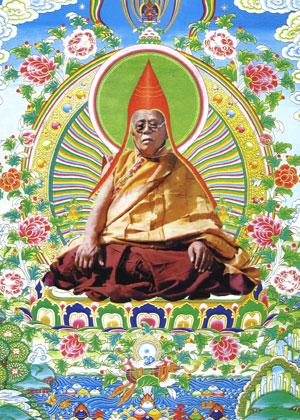Verses to Remove Hindrances and Sustain Realization of the Nature of Mind
I prostrate at the feet of the Guru, the Supreme Guide.
The practice itself is to see the guru as the actual Buddha, to supplicate him as such with a fierce devotion, to receive the four empowerments and to mix his wisdom with your mind.
At this time stare directly at the ordinary mind, the clear awareness of the moment, unbound by compulsive and negative ideas. Don’t be sad when the mind moves or happy when it is still. Likewise don’t apply remedies to loosen or tighten your mind; simply allow all to collapse and relax within the nature.
If thoughts wander outside, there is no need to think, ‘I should bring awareness home.’ etc., be without such modifications of mind. There isn’t any need to do this or stop that; simply remain open and free without any focal point whatsoever.
It isn’t possible to see the suchness of mind, so give up any idea of ‘seeing’ it. Whatever arises is simply the wondrous continuity of dharmakāya, free of any and all restriction. Simply ‘let go’ in the continual pervasiveness of utter relaxation.
The little child, mind, is none other than the six consciousnesses at ease. Don’t grasp at that which arises, be it good or bad; view it like a rainbow in the sky. Destructive thoughts and emotions liberate in and of themselves, like a snake uncoiling its own knots. Don’t follow your habits—if you desire something, cut the root of the one who desires. If you feel addicted, pluck out the root of addiction. If your mind is dull, cultivate it and use the experience to enhance your practice.
Carry the essence of your meditation session into post-meditation. If you feel a continuous renunciation, weariness and revulsion toward saṃsāra, these are signs of stability in your practice, as are deep devotion [toward the guru and his instructions], compassion, stability in the creation and completion phases of practice and the ability to die without regret.
This is the speech of a Virtuous Tramp. I have written it based on scripture, the oral instructions of my guru, as well as my own experience. May any ensuing virtue be of some use to you!
| Translated by Sean Price, 2016. First published on Lotsawa House, 2019.
